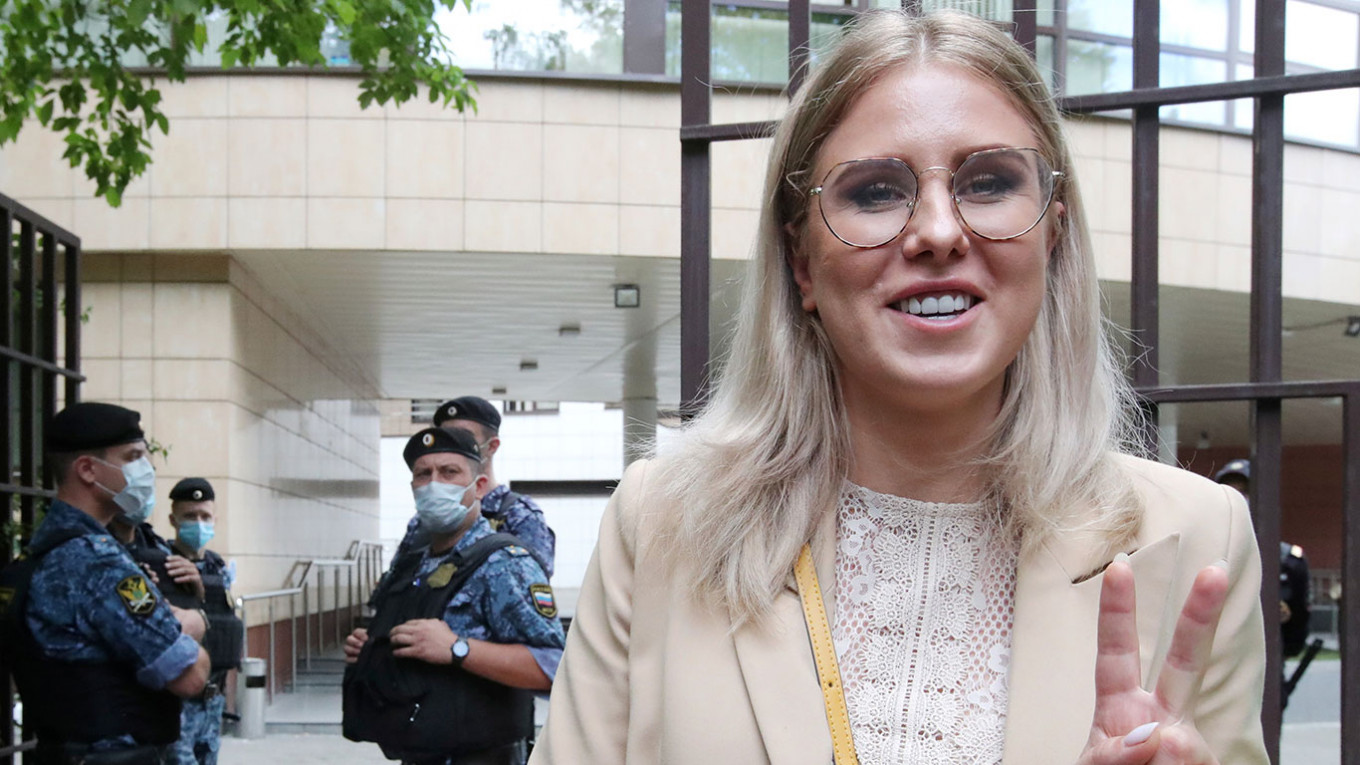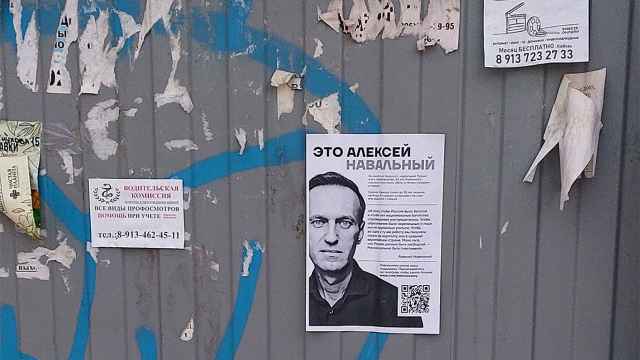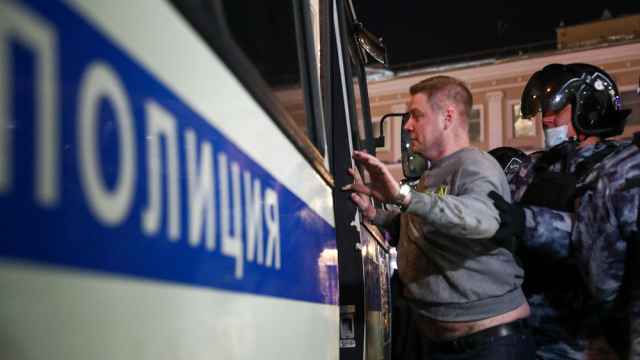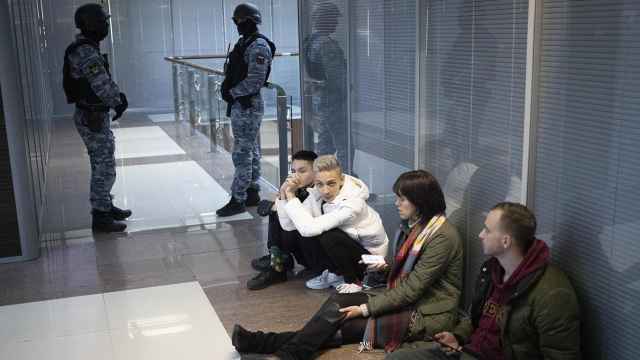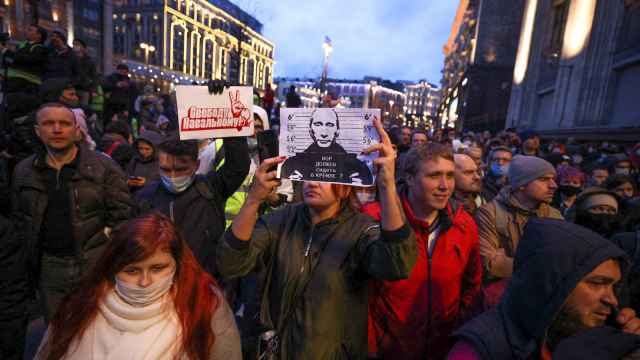Russian opposition figure Lyubov Sobol doesn’t intend to quit politics despite a court-appointed curfew and a ban on running for parliament, she told The Moscow Times on Wednesday.
The ally of jailed Kremlin critic Alexei Navalny was sentenced to 1.5 years of restricted freedom Tuesday over her role in organizing Moscow’s pro-Navalny protest on Jan. 23. Weeks earlier, she was forced to end her bid for Russian parliament when lawmakers branded Navalny’s groups “extremist” and passed a law banning members from seeking office.
“The Kremlin wants to put me on a short leash,” Sobol told The Moscow Times on a Zoom call. “I will use all the tools left available to me.”
Sobol is the first opposition activist accused of inciting violations of coronavirus rules by calling the Jan. 23 rally to be sentenced. Nine others have been charged in the so-called “sanitary case.”
Critics see the action as part of the authorities attempts to exclude opposition candidates from September’s elections to Russia’s lower house of parliament, the Duma, as the ruling United Russia party defends its supermajority from the threat of tactical voting by Navalny supporters.
Under her new restrictions, Sobol cannot leave Moscow, attend mass events or leave home from 10:00 p.m. to 6:00 a.m. She must also report on her whereabouts and activities to criminal inspectors three times per month.
Navalny’s brother Oleg, another co-defendant in the case, is due to receive his verdict next, which could see him sentenced to up to two years in prison.
Navalny was jailed in January upon his return to Moscow from Germany, where he spent months recovering from a near-fatal poisoning. Though tens of thousands of Russians protested for his release, he was sentenced to 2.5 years in prison over failing to meet probation terms on old fraud charges while in recovery.
“I do miss Navalny, not just as an activist but also as a friend,” Sobol said.
Sobol said she blames Russian authorities for Navalny’s August 2020 poisoning, which European labs and the global chemical weapons watchdog said used a variant of military-grade nerve agent Novichok.
“Just last August, no one could have imagined that Navalny would be poisoned with the use of chemical weapons and jailed for surviving,” she said.
Russian authorities have also put sticks in the wheels of Sobol’s own political ambitions.
In summer 2019, Moscow authorities’ refusal to let her and other opposition candidates run for city council set off weeks of protests in the Russian capital. Sobol would also spend a month on hunger strike in protest at the move.
In June, the former lawyer for Navalny’s Anti-Corruption Foundation (FBK) and producer of his YouTube shows was forced to withdraw her candidacy in this fall’s parliamentary elections after a court ruling outlawed Navalny’s groups as “extremist” and lawmakers passed legislation barring those affiliated with “extremist” organizations from the ballot.
The “extremist” designation also puts anyone who worked for Navalny’s networks at risk of up to six years in prison.
“Now any political activity — not just participation in rallies, but also distributing leaflets, reposting videos on the internet, commenting on the news agenda in Russia — all of this can be declared a criminal offense and extremist activity,” Sobol told The Moscow Times.
Among the former staff of Navalny’s groups, 21% have moved abroad, 29% are under investigation and 40% are engaged in their own projects and policies, according to estimates by the RBC news website. Navalny associates, including former FBK head Ivan Zhdanov and Navalny’s former regional coordinator Leonid Volkov, have fled Russia to avoid prosecution.
When asked whether she is considering leaving Russia herself, Sobol didn’t deny the possibility but also said that she has so far made no plans to do so.
“I don’t like to think ahead and think about what will happen next, since we live in an unpredictable country,” Sobol said.
Either way, she will face an uphill battle at home.
The recording studio and staff in charge of Sobol’s YouTube channel have been officially disbanded due to government pressure, and she now records all her content herself from her apartment.
Russia’s communication watchdog Roskomnador has instructed Twitter and YouTube to delete content posted by Sobol in addition to blocking 49 Navalny-linked websites, including Sobol’s. Despite this, she says she will continue tweeting and posting videos on YouTube.
“Today the legal field for engaging in political activity in Russia is narrow, but I will continue to do all I can,” Sobol said.
A Message from The Moscow Times:
Dear readers,
We are facing unprecedented challenges. Russia's Prosecutor General's Office has designated The Moscow Times as an "undesirable" organization, criminalizing our work and putting our staff at risk of prosecution. This follows our earlier unjust labeling as a "foreign agent."
These actions are direct attempts to silence independent journalism in Russia. The authorities claim our work "discredits the decisions of the Russian leadership." We see things differently: we strive to provide accurate, unbiased reporting on Russia.
We, the journalists of The Moscow Times, refuse to be silenced. But to continue our work, we need your help.
Your support, no matter how small, makes a world of difference. If you can, please support us monthly starting from just $2. It's quick to set up, and every contribution makes a significant impact.
By supporting The Moscow Times, you're defending open, independent journalism in the face of repression. Thank you for standing with us.
Remind me later.



